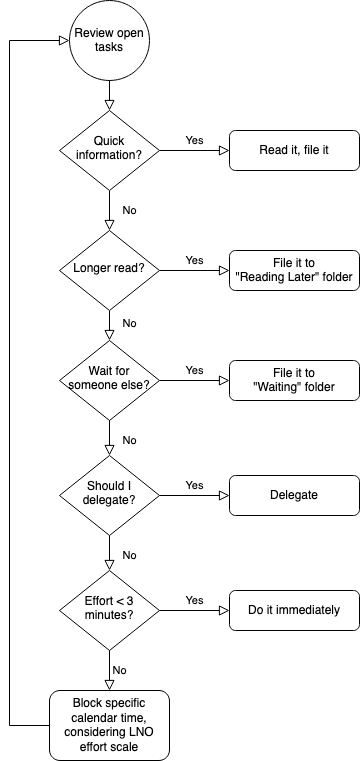How to manage tasks as a product manager
A system that works for all the tasks
As a product manager, just like any other knowledge worker, you have to manage a lot of tasks. You plan some of the tasks yourself because you want to move forward toward your goals, and you receive some of the tasks from others.
There will be a lot of tasks, usually tens of tasks per day, sometimes nearly 100 tasks per day. It is easy to lose control! How do you manage all the things to be done?
There are a few well-known frameworks to deal with task management:
Getting Things Done
The Getting Things Done (GTD) framework ensures that you quickly decide what to do with an issue, and touch it as little as possible. In general, when getting new work to be done, you decide on these steps:
Is it actionable? (If not, file it)
Can it be done in less than 2 or 3 minutes? If yes, do it right away. If not, plan it in your calendar.
Go through your calendar each day to work on planned tasks.
Additionally, keep a “Waiting” file or folder for anything that is currently waiting for other people.
Eisenhower Matrix
The Eisenhower Matrix is a tool differentiating between urgent and important tasks. You have four options to assign to a task:
Important and Urgent: Do it yourself right now!
Important, but not Urgent: Plan it into your own calendar.
Not Important, but Urgent: Delegate to someone else.
Not Important and not Urgent: Don’t perform the task at all. It’s not important and nobody is waiting for it, so why waste the time?
Many individual contributors without subordinates struggle to delegate tasks. However, this is possible more often than not: Ask the requester to prepare as much as possible, refer to other functions in the company, just ask a colleague if he or she can help…
Leverage - Neutral - Overhead
The Leverage - Neutral - Overhead (LNO) framework by Shreyas Doshi is relatively new. With LNO, you can manage how much effort/time you should spend on a task if it needs to be done at all.
Leverage: These are the tasks that really drive value. You reach your goals if these tasks are done well. Spend as much time as possible on these tasks and really nail them. They yield a 10x return.
Neutral: These tasks yield a 1x return. Do them well, but no over-commitment, please.
Overhead: This just needs to be done, and results in a return of less than 1. Just get them done. Try actively to do a bad job because you will be quicker and can spend more time on the Leverage tasks.
Full task management with a combination of frameworks
So which of these frameworks should you choose?
I personally decided to use a combination of the tasks. Mostly, it is a mental process, but I use some tools for assistance.
My process is the following:
Review tasks at defined times during the day, and when you have some spare time left. Do not constantly monitor incoming channels. Turn off email notifications.
Is it a piece of quick information? → Read it, then file it.
Is it a longer document that needs to be read? → File it in a special place to read later.
Do I have to wait for someone else first? → Put it into a “Waiting folder”. If there is a deadline, assign it to the tasks.
Now I have actionable tasks left. I’ll proceed as follows:
Can or should it be delegated? → Delegate it. Ask others for help, including the requester.
Now all the tasks that require action on my side remain. I’ll proceed as follows:
Can it be done in less than 3 minutes? → Do it right away.
Does it take longer than 3 minutes? → Set a deadline and reminder for a specific date. Better yet: Reserve time in the calendar. Do not block time for “doing tasks” but for the specific task.
Review all due tasks at the beginning of every working day.
This process usually work well for me. First I read information, this I rid myself of tasks I should not be doing, then I plan everything that I need to do.
More or less, the mental process looks like this:
Tooling
Unfortunately, I have not found proper tools to work with all tasks. There are some Outlook plugins that work not all too well. For Outlook emails, I set up categories: Important+Urgent, Important+NotUrgent, NotUrgent+Important (and I skip NotImportant+NotUrgent because I’m not going to do them anyway). This also works for other email programs.
What about other channels? Within Slack/Teams/Element, you cannot set up categories. I did not find any solution other than bookmarking the message with the task. This is not working particularly well with my framework but all I can do.
Microsoft Tasks is a Microsoft 365 tool for task management. It is well integrated into Outlook and you can set up different lists, as well as setting Due Dates and reminders. The good thing is the integration into Outlook to combine any tasks with emails and vice versa.
But what if I receive messages on different channels and would like to keep a single list?
Well, that’s a problem and it’s mostly the case. There is no single tool to solve this. Copy-and-pasting to Tasks tool/Notion/Miro/Slack is not a viable option because it breaks the link to the original message. If you have a solution, feel free to share it :-)



